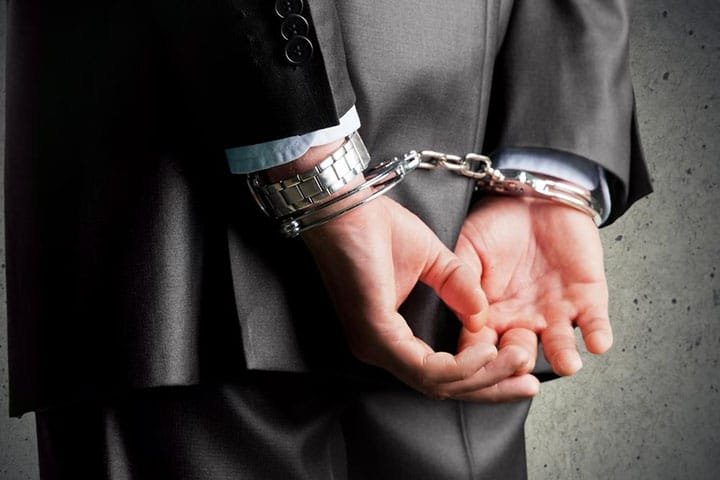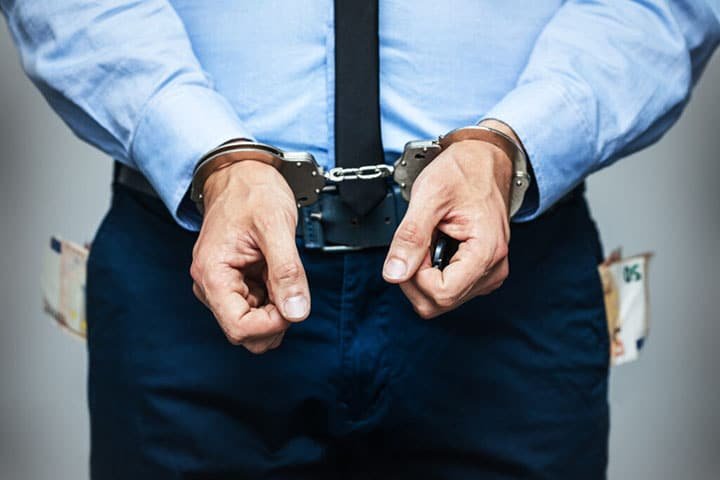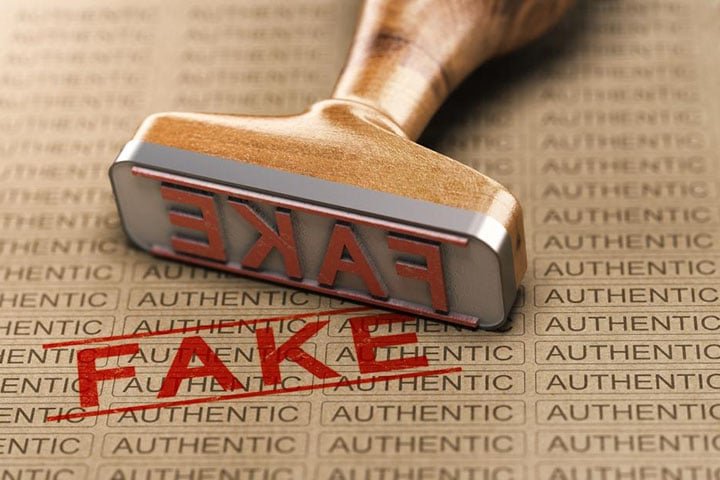
Singapore’s authorities have been stepping up their efforts to tackle white collar crime, employing cutting-edge technology to identify and prosecute even the most complex of cases. Most white collar crimes are usually characterised by deceit, concealment, or violation of trust, and under Singapore law, white collar crimes are defined as:
- Financially motivated;
- Nonviolent; and
- Committed by businesses or government professionals.
Because it is possible to be an unwitting accomplice or provide assistance to offenders without realising it, understanding white-collar crimes is crucial.
This is especially important for all Singaporeans, especially people in businesses or governments, to understand what constitutes white collar crimes under Singapore law.
While there are many types of white collar crimes, we will cover the 3 most common in Singapore: embezzlement, forgery, and money laundering.
#1. Embezzlement

Embezzlement is defined as theft of property that one possesses but does not own. The person must have been entrusted with the property, and then used it dishonestly in order to gain an illegal benefit.
In a recent real-world example, a former Shell employee pleaded guilty to embezzlement of $49 million worth of misappropriated gas oil throughout 2017 and 2018. He was part of a conspiracy to illegally siphon and sell gas oil from the company’s Pulau Bukom manufacturing site to unauthorised vessels.
In Singapore, cases of embezzlement are typically prosecuted under the offence of Criminal Breach of Trust (CBT), which is governed by sections 405-409 of the Penal Code.
Under general CBT, someone found guilty of embezzlement may be sentenced to imprisonment of up to 7 years, a fine, or both. For aggravated CBT – when the accused is in a position of trust, such as a public servant, banker, or agent – the prison sentence can go up to 20 years.
#2. Forgery

When someone falsified documents, signatures, or imitates a commodity of value for the purposes of deception, they are guilty of forgery. Forgery is governed by section 463 of the Penal Code, which states that a person charged with forgery must have created the false document – whether electronic or physical – for the purposes of fraud.
The scope of forgery cases can vary widely, from the US$56 million defrauded by oil tycoon Lim Oon Kuin of Hin Leong Trading through the use of falsified contracts, to the 2 men who were charged with cheating the government of COVID-19 support grants through the use of fake retrenchment letters.
If found guilty of forgery, a person may be punished with imprisonment of up to 4 years, a fine, or both.
#3. Money Laundering

Money laundering is the process of using deception to make money obtained from illegal or criminal activities (‘dirty’ money) appear like they came from legitimate sources (‘clean’ money).
There are 4 types of money laundering offenses that are punishable under acts 43-47 of the Corruption, Drug Trafficking and Other Serious Crimes (Confiscation of Benefits) Act (CDSA):
- Criminals laundering their own money: When a person uses ‘dirty’ money to purchase legitimate assets like property, and then attempts to convert, transfer, or remove the property from Singapore.
- An individual who benefits from the criminal activities: If a person purchases property that he/she knows or has grounds to believe was acquired by ‘dirty’ funds, they may also be prosecuted for money laundering.
- Abetment of money laundering: A person who deliberately conceals or disguises property or removes it from Singapore despite knowing or suspecting that it was acquired by ‘dirty’ funds is liable to money laundering charges.
- Someone who participates in it with the headman: Entering into an arrangement or agreement to obtain control or retention of the ‘dirty’ property also makes one liable for money laundering.
Some ways people may unwittingly be participating in money laundering include:
- Travelling in or out of Singapore with more than $20,000 in cash and failing to declare it
- Agreeing to help “friends” sell their properties on their behalf
- Agreeing to receive overseas money transfers on behalf of a “friend”
- Helping a “friend” remit money overseas
Money laundering carries a punishment of up to 10 years’ imprisonment, a fine of up to $500,000, or both.
#4. Cybercrime

Cybercrime includes a wide range of criminal activities carried out using computers or the internet. These crimes often target the vulnerabilities in technology that individuals and businesses rely on.
Common forms of cybercrime include hacking, where unauthorised access is gained to computer systems, and identity theft, where personal information is stolen to commit fraud. Financial scams are also prevalent, with perpetrators tricking victims into sending money or revealing sensitive financial information.
An example of cybercrime as a white-collar crime in Singapore is the significant rise in digital fraud attacks targeting e-commerce payment transactions. According to a report by LexisNexis, these attacks are often conducted by international fraud rings that exploit Singapore’s status as a financial hub.
Automated bots are frequently used to test stolen credentials, leading to fraudulent activities across banking accounts and online services. This surge in cybercrime reflects Singapore’s vulnerability due to its open economy and digital transaction growth.
In Singapore, the Cyber Security Agency (CSA) and the Singapore Police Force work together to combat cybercrime. They focus on raising public awareness, providing cybersecurity training, and actively pursuing and prosecuting offenders.
Those caught engaging in cybercrime can face significant white collar crime jail time, with harsh punishments including imprisonment and hefty fines.
#5. Insider Trading

Insider trading occurs when individuals trade stocks or other securities based on material, non-public information. This gives them an unfair advantage over other market participants, as they act on confidential knowledge before it becomes available to the public.
Insider trading is typically committed by company executives, directors, or employees who have access to sensitive information about the company’s financial status or future business plans.
An example of cybercrime as a white-collar crime in Singapore can be seen in insider trading cases. In 2024, Mr. Tay Joo Heng was fined S$70,000 for insider trading involving shares of GS Holdings Limited. Mr. Tay used confidential information about the sale of a subsidiary to purchase shares, anticipating a price rise.
This misuse of non-public information constitutes both insider trading and a form of cybercrime due to the manipulation of market data, which is considered illegal under Singapore’s Securities and Futures Act.
#6. Market Misconduct
Market misconduct refers to illegal activities that distort market prices or mislead investors. This includes practices like stock manipulation, false trading, and spreading misleading information to influence market behaviour.
An example of market misconduct as a white-collar crime in Singapore is the case involving Mr. Soh Chee Wen and Ms. Quah Su-Ling, who orchestrated a complex scheme to manipulate the shares of Blumont Group Ltd, Asiasons Capital Ltd, and LionGold Corp Ltd.
Between August 2012 and October 2013, they engaged in market and price manipulation, creating a false appearance of the market for these shares. Additionally, they deceived financial institutions, cheating them out of over $957 million through the use of controlled accounts as collateral to obtain financing.
Both individuals were convicted and sentenced to long prison terms for their roles in the scheme, highlighting the severity of such offences in Singapore’s capital markets.
#7. Bribery And Influence Peddling

Bribery involves offering, giving, receiving, or requesting something of value in exchange for influence or favourable action, especially in business or public affairs. Influence peddling is a related offence where someone improperly uses their connections to gain an advantage.
Common examples of bribery include offering money or gifts to secure business contracts or receiving kickbacks in exchange for awarding tenders or contracts.
Bribery and influence peddling are governed by the Prevention of Corruption Act (PCA). These offences undermine public trust and the integrity of public institutions.
In Singapore, strict laws ensure that public officials, including Members of Parliament (MPs) and members of public bodies, are held accountable for corrupt acts.
Bribery Of Members Of Parliament
Under the PCA, bribery involving a Member of Parliament (MP) is a serious offence. Any individual who offers gratification (in the form of money, gifts, or favours) to an MP as an inducement or reward for the MP’s actions or inactions in their official capacity can be found guilty of bribery.
Likewise, if an MP solicits or accepts gratification for performing or refraining from performing duties in their official role, they too are committing an offence.
The penalties for such crimes are severe. Upon conviction, the offender faces a fine of up to $100,000, imprisonment for up to seven years, or both. This reflects Singapore’s commitment to maintaining the integrity of its political system and preventing corrupt influences from undermining governance.
Bribery Of Members Of Public Bodies
Similarly, bribery involving members of public bodies is also an offence under the PCA. This includes any form of inducement offered to a member of a public body in exchange for favourable treatment, such as influencing a vote, expediting or delaying official actions, or securing contracts and advantages.
The members of the public body may also be guilty of bribery if they solicit or accept gratification in exchange for such actions.
Like bribery involving MPs, the consequences for bribing a member of a public body are stringent. Offenders can be fined up to $100,000, imprisoned for up to seven years, or both.
#8. Concealment
Concealment in white-collar crime refers to hiding assets or financial transactions to evade taxes, launder money, or deceive creditors. This practice can occur in both personal and corporate settings, often involving complex methods to obscure the origins or movement of illicit funds.
An example of concealment as a white-collar crime in Singapore can be seen in the SW Trustees Pte Ltd v Teodros Ashenafi Tesemma case. In this case, the plaintiffs, an insolvent company and its liquidator, accused several defendants of selling assets at an undervalue.
They sought to amend their case to include new claims of conspiracy and fraudulent concealment. The fraudulent concealment involved allegations that certain payments related to the sale were intentionally withheld from the company, misleading key stakeholders.
The case revolved around whether the limitation period for bringing these claims could be postponed under the Limitation Act.
The court clarified that for a limitation period to be postponed due to fraud, the fraudulent concealment must have been carried out by the specific defendant against whom the action is being brought.
This case highlights how concealment, when fraudulently executed, can obstruct the discovery of wrongdoing and delay legal claims, a critical issue in white-collar crime involving corporate malfeasance.
#9. Consumer Fraud

Consumer fraud involves deceptive practices that aim to illegally obtain money or property from individuals. This can take many forms, such as false advertising, selling defective products, or engaging in misleading business practices.
In recent years, online scams have surged in Singapore, with a 400% increase in cases over the last five years.
Common examples include investment scams that promise high returns with minimal risk, lottery scams where victims are falsely told they’ve won a prize, and tech support scams where fraudsters pose as technical experts to gain access to personal information.
Consumer fraud undermines trust and causes significant financial harm to victims. Singapore has robust laws in place to protect consumers from such fraudulent activities.
Offenders found guilty of consumer fraud can face severe white collar crime jail time and hefty penalties, ensuring justice is served and victims are protected.
Conclusion About White Collar Crime In Singapore

Get in touch with a lawyer immediately to understand what legal defences are available to you, and be sure to collect as much evidence as possible. It is critical that you are completely honest with your lawyer in order to receive the most timely and effective advice.
Our top-notch team of corporate, commercial, and criminal lawyers in Singapore are committed to putting your interests first, and will work toward the best possible outcome for your case. In family matters, our divorce lawyer in Singapore provides crucial guidance and support.
Contact us today and let’s discuss your next course of action.
Frequently Asked Questions About White Collar Crime In Singapore
Does White-Collar Crime Only Involve Financial Institutions?
No, white-collar crime is not limited to financial institutions; it can occur in various sectors, including corporate environments, government agencies, and non-profit organisations. This type of crime often involves deceitful practices that aim to secure an unfair advantage or gain financial benefit.
Examples include fraud, embezzlement, and bribery, which can take place in any organisational context where individuals have the opportunity to manipulate systems for personal gain.
Can Individuals Be Held Personally Liable For White-Collar Crimes Committed In A Corporate Setting?
Yes, individuals can be held personally liable for white-collar crimes committed in a corporate setting, especially if they are found to have directly participated in or facilitated the wrongdoing.
The legal principle of “piercing the corporate veil” allows authorities to hold individuals accountable, regardless of their corporate status, if they acted with intent or negligence.
This means that executives, managers, and employees may face criminal charges and civil liabilities if their actions contribute to fraudulent activities within the organisation.
When Should A Business Conduct An Internal Investigation For Potential White-Collar Crime?
A business should conduct an internal investigation when there are credible allegations or indications of wrongdoing, such as discrepancies in financial records, unusual employee behaviour, or whistleblower reports.
Timely investigations are crucial to mitigate potential damage, including financial losses and reputational harm.
Additionally, if regulatory bodies are involved or if the business suspects non-compliance with laws and regulations, initiating an internal investigation can help clarify the situation and demonstrate the company’s commitment to integrity.
Can White-Collar Crime Be Linked To Organised Crime In Singapore?
Yes, white-collar crime can be linked to organised crime in Singapore, particularly in areas such as money laundering, corruption, and fraud. Organised crime groups may exploit legitimate businesses and financial systems to facilitate their illicit activities, using sophisticated methods to obscure the origin of their funds.
The interconnectedness of white-collar crime and organised crime poses significant challenges for law enforcement, as it often involves complex financial transactions that require thorough investigation and collaboration across various agencies.